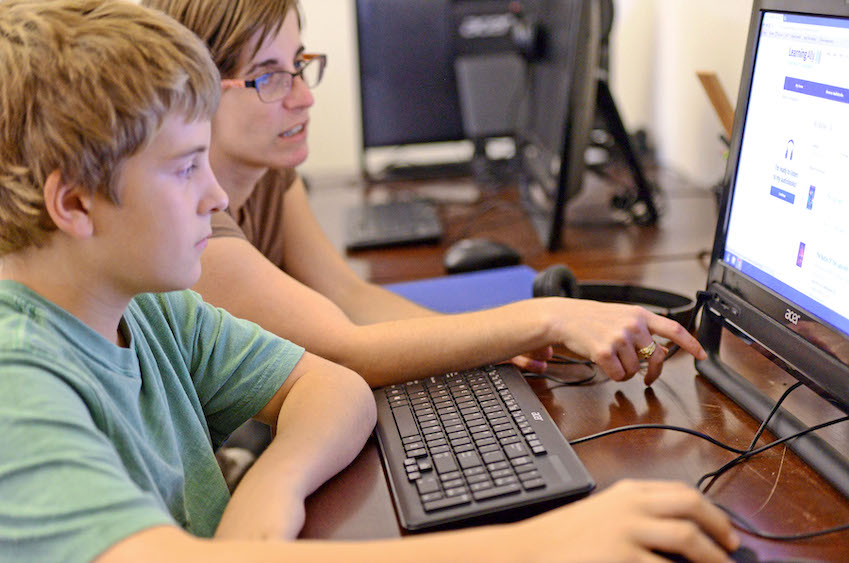Is Dyslexia a Dirty Word in Ojai?
By Gloria Ellis
I’ve often experienced the feeling that terms such as dyslexia, autism, and ADHD are seen as “dirty words” in our community. I’ve noticed, many times, that when I’m speaking with teachers, parents, and other professionals in the Ojai Valley, there is an inherent fear of talking openly about learning disabilities. Educators at various schools will sometimes refer to students as “late bloomers” or perhaps as having “learning differences,” but they are reluctant to share their concerns within the framework of an identifiable learning disability or developmental disorder.
Teachers and school administrators are clearly afraid to label students. This may stem from a fear of offending parents, particularly in private schools where there may be concerns that such a discussion could alienate paying customers. Parents are often afraid to label their children for fear of stigmatizing them in the eyes of their teachers and peers. These are understandable fears; however, I believe that the unspoken agreement to remain silent about children’s learning difficulties ultimately harms them educationally and emotionally.
The reluctance to discuss potential learning disabilities does not serve students and, in fact, is likely to damage a student’s self esteem far more than the popular practices of ignoring challenges and avoiding these difficult conversations. In my personal and professional experience, I have learned that refusing to talk about learning challenges can cause numerous problems. For one thing, avoiding conversations about potential learning disabilities or developmental disorders reduces opportunities for children to receive early intervention. Early identification and intervention can be hugely beneficial and, for many students, are crucial if these children are to thrive in their future learning environments and adult pursuits.
Another negative side effect of avoiding conversations about learning challenges is that students can, and often do, pick up on this avoidance. When students sense their own difficulties, and also recognize that the adults in charge of their well being are reluctant to talk about those difficulties, they may internalize feelings of doubt and fear. They are left to conclude that their situation must be dire since absolutely no one will talk with them about their obvious challenges.
I cannot tell you how often I have sensed students’ relief when, upon initial assessment, I share with them my interpretation of their difficulties. For many of them, there is a sense that, finally, someone is ready to talk to them about their struggles and help them to overcome their challenges. Surprisingly, to many parents, students often express enjoyment of the assessment process. I believe that this is because they are kept informed regarding my understanding of their struggles and the solutions that I propose for helping them to overcome those challenges. I have seen this single discussion point, communicated over a 90-minute assessment period, completely change students’ attitudes about themselves and their learning. More often than not, students of all ages leave the assessment feeling optimistic and ready to tackle their challenges.
So why are adults so reluctant to openly discuss potential learning disabilities? The more generous view is that this reluctance is based on fear and a lack of understanding. I see that many parents and educators view labels such as autism or dyslexia as a dead end. They have no idea how to help a student overcome certain learning challenges and they have limited knowledge of who to refer these students to in order to get them the help they need. The harsher view of this behavior is that the ableist perspectives of educators generate the opinion that students with learning disabilities are somehow “less than” typically developing learners. When someone claims to be colorblind, it is often a mask for repressed racism. In the same way, if someone cheerily claims that my daughter, who is diagnosed with autism, is “just like all the other kids,” I get the strong sense that this is a person who sees autism as some sort of insurmountable deficiency; it is something to fear rather than simply a challenge that requires a different teaching approach. My interpretation of this fear is not a pretty one. I find this fear to be offensive, and I see that the behavior it elicits often borders on outright discrimination. Even more obvious is the reality that the educator who will not acknowledge my child’s challenges will never be a person I can rely upon to help her overcome them.
Autism is not a dirty word. Dyslexia is not a dead end. ADHD should never be mistaken for laziness. Learning disabilities and developmental disorders are challenges that require understanding and different teaching approaches. As someone who is trained in clinical psychology, works as an educational therapist, and is raising a daughter who is diagnosed on the autism spectrum, I never view a learning difficulty as an insurmountable obstacle. I see it as a puzzle and a challenge that we can work through. I talk with all of my students about their brains and, together, we work to build new pathways to learning the skills and knowledge that are essential to their success in our world. Whether the challenge is emotional, academic, behavioral, social, sensory, or language based, I want my students to understand their brains, know their strengths, accept their challenges, work to overcome those challenges, and know that they are valuable no matter where they are in this process! This is understanding that benefits all students and something that students with learning challenges truly need.
Lighthouse School: Projects in Self-Awareness
True self-esteem depends on genuine self-awareness and both of these traits are essential to the significant growth we aim to facilitate in our students. As part of their participation in the Lighthouse School program, several of our middle-school students researched challenges that impact their own learning. They share their understanding, opinions, and suggestions for educators in this YouTube video which was written and produced by our students. Watch their video here.
Additionally, as part of a personal project undertaken over the past several months, our middle-school student, Micaela Ellis, has written a memoir about her experiences growing up with Autism. Her book, Autism Over the Years, is now available for purchase. Click here to get your copy from Amazon!



I have seen this as well in my years working for the district. Honestly, I think they don’t know what to do with the child that is dyslexic and don’t know how to help them or don’t have the resources available. OUSD is one of the smallest and least funded school districts in the state. Teachers here are paid the least out of the entire state (especially when you consider cost of living here). The teachers I have met are the most passionate or they wouldn’t still be doing this job, they don’t do it for the money; they also don’t have a ton of resources available to them that would perhaps be more accessible in a larger district. I think they do pretty well with ASD diagnosis and services; could more be done? Always. The ones that have the hardest time in this district though are the kids with severe behavioral issues or disabilities- they get ‘shipped out’ to schools outside of Ojai making it difficult for parents- I met one child who has to go to school in Camarillo and rides the bus for over 2 hours a day! In his case, I do believe the district here could have handled him but perhaps they were afraid to take on the challenge?